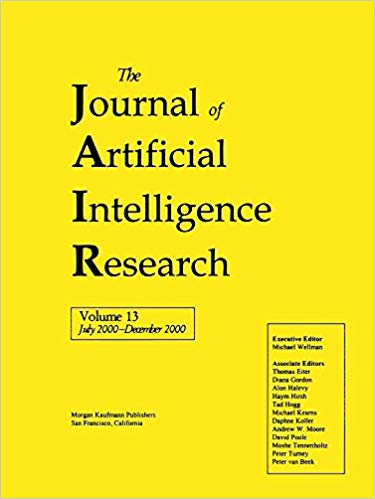
Journal of Artificial Intelligence Research (JAIR) - Issue 44 论文列表
| 点击这里查看 Journal of Artificial Intelligence Research 的JCR分区、影响因子等信息 |
| 卷期号: Issue 44 |
| 发布时间: |
| 卷期年份: 2011 |
| 卷期官网: |
本期论文列表
Making Decisions Using Sets of Probabilities: Updating, Time Consistency, and Calibration.
Finding Consensus Bayesian Network Structures.
Multi-Robot Adversarial Patrolling: Facing a Full-Knowledge Opponent.
Computing Approximate Nash Equilibria and Robust Best-Responses Using Sampling.
Centrality-as-Relevance: Support Sets and Similarity as Geometric Proximity.
Learning to Make Predictions In Partially Observable Environments Without a Generative Model.
Unfounded Sets and Well-Founded Semantics of Answer Set Programs with Aggregates.
Representing and Reasoning with Qualitative Preferences for Compositional Systems.
Cloning in Elections: Finding the Possible Winners.
Scheduling Bipartite Tournaments to Minimize Total Travel Distance.
Where Are the Hard Manipulation Problems?
Dr.Fill: Crosswords and an Implemented Solver for Singly Weighted CSPs.
Interpolable Formulas in Equilibrium Logic and Answer Set Programming.
MAPP: a Scalable Multi-Agent Path Planning Algorithm with Tractability and Completeness Guarantees.
Theoretical and Practical Foundations of Large-Scale Agent-Based Micro-Storage in the Smart Grid.
Defeasible Inclusions in Low-Complexity DLs.
On the Link between Partial Meet, Kernel, and Infra Contraction and its Application to Horn Logic.
Topological Value Iteration Algorithms.
Adaptive Submodularity: Theory and Applications in Active Learning and Stochastic Optimization.
Most Relevant Explanation in Bayesian Networks.
First-Order Stable Model Semantics and First-Order Loop Formulas.
Stochastic Enforced Hill-Climbing.
Combining Evaluation Metrics via the Unanimous Improvement Ratio and its Application to Clustering Tasks.
Drake: An Efficient Executive for Temporal Plans with Choice.

